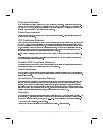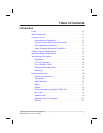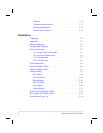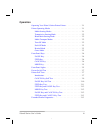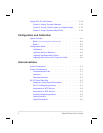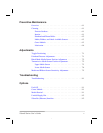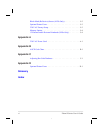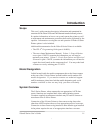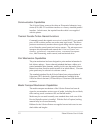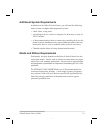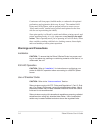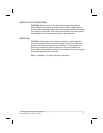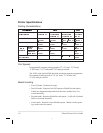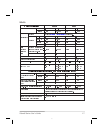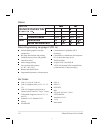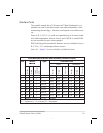
Communication Capabilities
The S-Series Printer comes with either an Electronics Industries Asso-
ciation (EIA) RS-232 serial data interface or a factory-installed parallel
interface. In both cases, the required interface cable is not supplied
with the printer.
Thermal Transfer Printer Internal Functions
Command/control data signals are received via the RS-232 port, parallel
port, or DIP switches and are sent to the main logic board. The micro-
processor continuously monitors these signals along with the inputs re-
ceived from the control panel and various sensors. The microprocessor
interprets this information and controls the S-Series Printer me-
chanics, printhead, communications, command interpreta-
tion, label formatting, media control, and mechanical drive.
Print Mechanism Capabilities
The print mechanism has been designed to print random information la-
bels, tickets, and tags. It uses a thermal printhead that heats a ribbon as it
passes beneath the print elements, melting its ink onto the media (direct
thermal uses heat-sensitive media instead of an inked ribbon). Constant
print speeds may be selected via software control.
The standard printhead for the S-Series Printer has a print resolution of
8 dots/mm (203.2 dots/inch). Optional printheads are available for the
105Se for either 6 dots/mm (152 dots/inch) or 12 dots/mm (300 dots/inch)
resolution.
Media Transport Mechanism Capabilities
The media transport mechanism of the S-Series Printer has been de-
signed to accommodate various types of media, including die-cut labels,
ticket and tag stock, continuous roll, and fanfold media.
Media may be rewound internally onto standard three-inch cores if the
Rewind Spindle option is installed. With the Peel-off option, backing
material may be rewound internally.
Ribbons for the S-Series Printer are supplied on one-inch cores in stan-
dard widths and lengths.
1-2 Zebra S-Series User’s Guide
10



